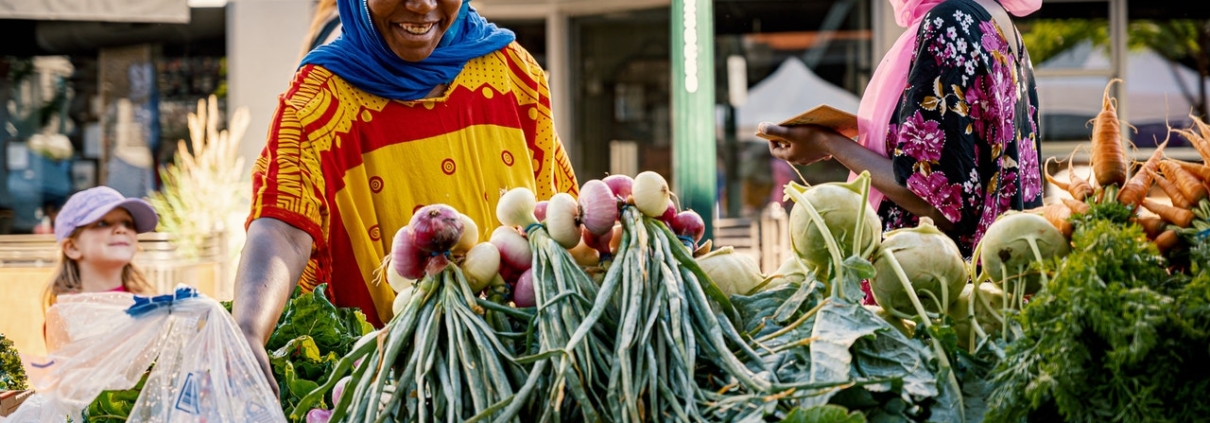Small is powerful! (when it comes to changing food systems)

Latest posts
Share:
Change is imperative... but how?
I warmly welcome the near unity in voices across the world, calling for our food systems to better serve people and the planet. This will be the major cry too, at the UN Food Systems Summit in New York this month. But two important questions to consider are: ‘How to achieve this?’ and ‘What more do we need to know?’
Like many organisations, Wasafiri is actively seeking ways to help catalyse transformational shifts in food systems. Our desired outcome is simple: we want healthier and more sustainable foods to be grown and eaten everywhere.
One means of transforming the food supply is to help those who run micro and small food enterprises to flourish. After all, they produce most of the healthy, sustainable, local foods for local markets. These are often used by low-income consumers.
Kenya is a case in point; as a country with strong market activity and therefore opportunity for entrepreneurial people, the country provides an important barometer for what is possible.
But surely, these tiny businesses are too small to make a difference? Ants or termites provide a useful analogy. Individually their impact is minute as they go about their work – but taken collectively a colony of ants or brood of termites can create dramatic physical change in the environment. Collective action counts. Small can be powerful when harnessed.
Small businesses count
Let’s get a bit more specific and evidence-based. Harnessing the domination of micro, small and medium enterprises (MSMEs) is essential for meaningful change of national food systems in Africa.
MSMEs constitute the key part of the food environment that enables or constrains consumers’ access to food. They are big players in the production, processing, and retailing of fruits and vegetables, animal-source foods, and cereals and legumes in Africa1. They play an essential role in food supply chains and in ensuring food and nutrition security of most low-and middle-income countries (LMICs)2.
In Kenya, MSMEs in the agri-food sector play a key role in enhancing food and nutrition security and constitute a significant part of the economy including in urban areas3.
A 2016 MSME survey by the Kenya National Bureau of Statistics found that 96% of the surveyed enterprises were microenterprises. In addition, the Kenya Integrated Household Baseline Survey (KIHBS) 2015/2016 data indicates that about 96% of healthy and sustainable foods consumed by households was sourced from micro and small enterprise – a combination of open-air market traders, general shops, kiosks, specialized shops, other households, and roadside or hawkers.
The point is hopefully clear: many food businesses are small and taken together, small counts!
Do we know how to help small food businesses?
The barrier to making better progress is that the role and dynamics of micro and small enterprises within the food system in Kenya are not well understood, and this is particularly true when it comes to a fundamental question: how can we support micro and small businesses produce healthier and more sustainable foods at a large enough scale that is accessible and affordable to mostly low-income Kenyan consumers?
The answer is no, not yet.
Answering this question is an important challenge that Wasafiri is responding to in Kenya. We are working together with Village Enterprise and Shack Dwellers International on a two-year research programme that started in April 2021. We are supported in this by the IDRC – who, in turn, is supported by the Rockefeller Foundation and the Canadian Government.
The focus is how to better shape an ecosystem of programmes, policies and interventions that can nudge small businesses to contribute towards greater volumes of good quality, nutritious foods to meet demand in the market.
Generating the knowledge that is needed
While managing COVID-19 risks we are excited to start this research with micro and small business owners in Kibera, Nairobi’s largest informal settlement, in September 2021. Our efforts will evolve over time to empower micro and small business leaders and those that establish the policy environment for such businesses in three counties: West Pokot, Bungoma and Nairobi.
The findings will inform thinking locally, nationally and regionally and we are rallying stakeholders who may be interested to engage with us on this journey. So, feel free to get in touch: alex@wasafirihub.com or george@wasafirihub.com.
This research will not be ready for the UN Food Systems Summit on 23 September 2021, so stakeholders must work with what is available. Policymakers and influencers can take account of world-class work by Wasafiri in July 2021, on behalf of the UN Food Systems Summit Secretariat, that engaged and sought the voices of small businesses from 137 countries in how to help them scale up their wonderful efforts to transform our food systems.
Led by my fabulous colleague Ian Randall with a wonderful team – see A Small Business Agenda and here is his blog.
- Demmler, 2020
- Nordhagen et al., 2021
- Owuor, 2020; Githiri et al., 2016
Photo by Brett Sayles from Pexels








